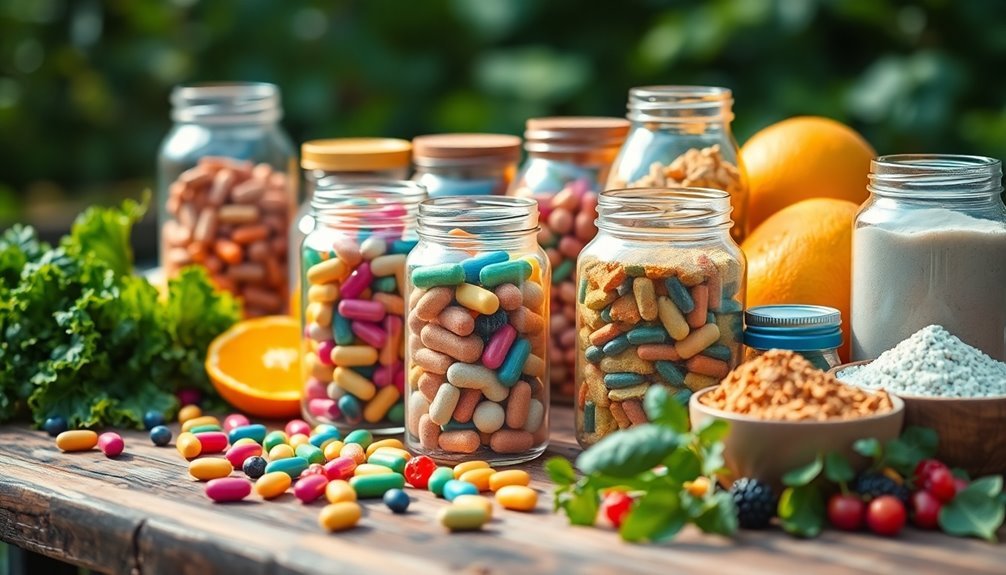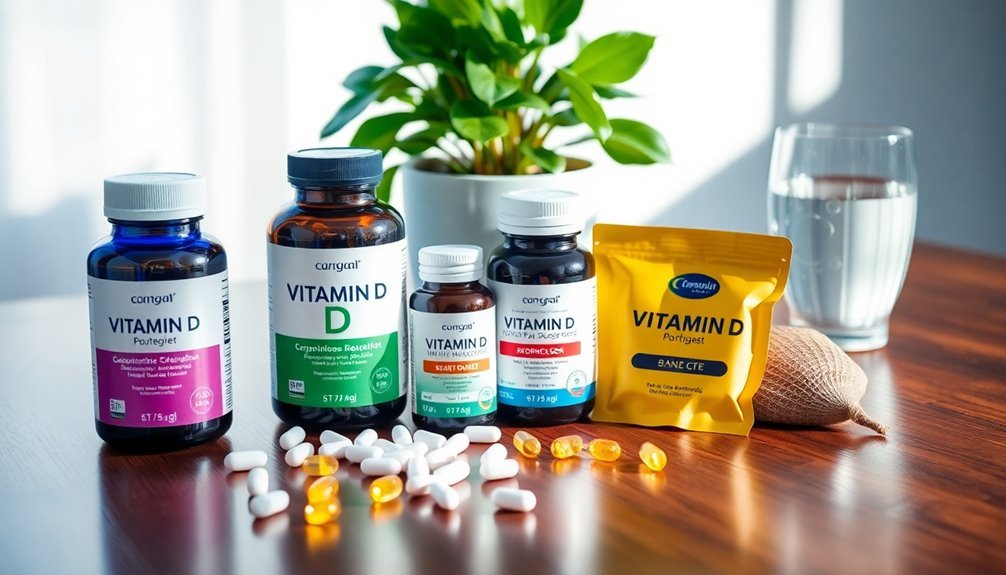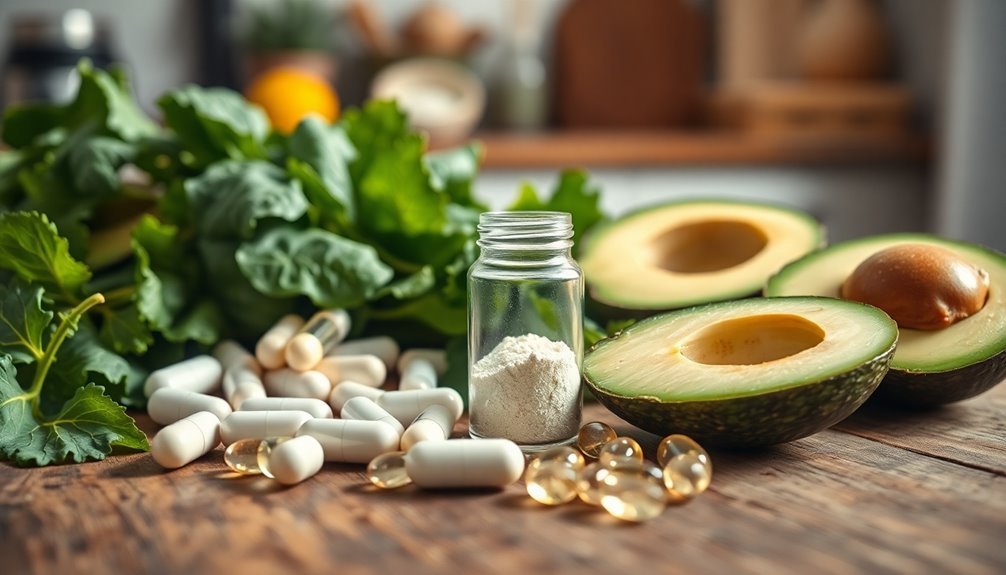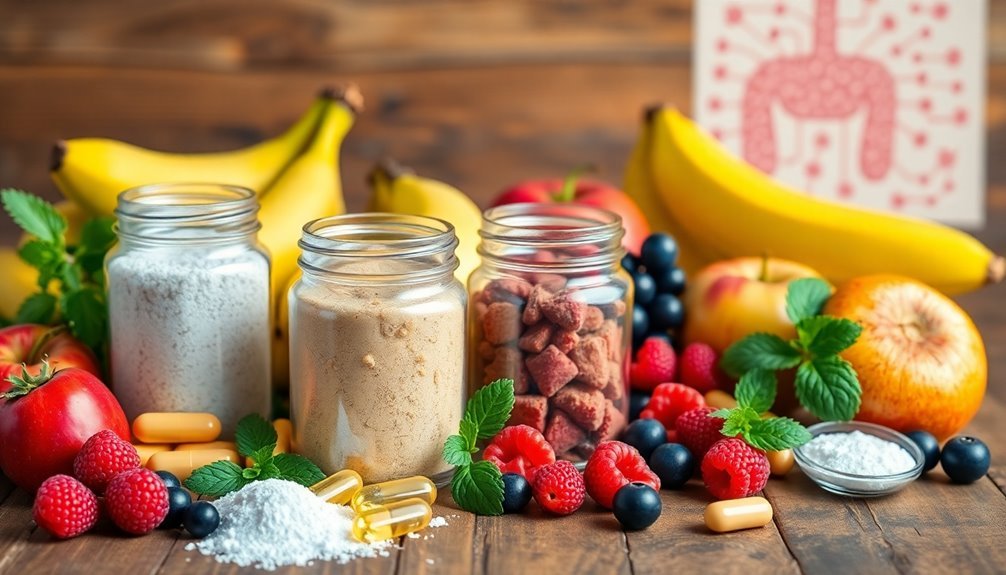In 2024, improving your gut health is achievable with top supplements like probiotics and glutamine. Probiotics can restore digestive balance with strains like Bifidobacterium and Lactobacillus. Glutamine supports the gut barrier and helps alleviate symptoms of IBS. Vitamin D boosts immune regulation and enhances microbiome diversity. Curcumin brings relief from IBS-related pain, while butyrate aids immune function and blood sugar control. Collagen strengthens your gut barrier and supports beneficial bacteria growth. Lastly, prebiotics promote nutrient absorption and digestive regularity. Each supplement offers unique benefits, and their impact on your health is worth exploring further.
Key Takeaways
- Probiotics with multiple strains enhance gut health by promoting beneficial bacteria growth and supporting gut barrier function.
- Glutamine supports gut repair, alleviates IBS symptoms, and protects against leaky gut.
- Collagen strengthens the gut barrier and promotes beneficial bacteria growth.
- Vitamin D improves microbiome diversity and enhances gut immunity.
- Curcumin reduces inflammation and balances gut microbiota, aiding IBS relief.
Probiotics for Digestive Balance

Harness the power of probiotics to support your digestive balance by understanding the key elements that make these supplements effective.
When choosing a probiotic, focus on the strains and species that are well-researched for promoting gut health maintenance. Probiotic strains like *Bifidobacterium* and *Lactobacillus* have clinical evidence backing their benefits for improving digestion and maintaining a healthy gut microbiome. Verify the products you choose have clear manufacturer transparency, detailing the specific strains used and any supporting clinical studies. Align Probiotic, for instance, is the #1 Doctor Recommended Probiotic Brand, trusted by gastroenterologists for its effectiveness.
To maximize benefits, consider the dosing range of 1–50 billion CFU per serving. This range has been shown to effectively support gut health. Combining multiple probiotic strains can offer broader benefits, but remember that specificity is important when targeting particular digestive issues.
Seek strains such as *Bifidobacterium 35624*, which is formulated to alleviate symptoms like bloating and gas, or *Lactobacillus*, renowned for its general gut health attributes.
Ultimately, maintaining gut health with probiotics involves selecting the right strains, understanding dosing, and validating product quality. By prioritizing these factors, you can effectively harness probiotics to aid your digestive balance and overall well-being.
Benefits of Glutamine
You've probably heard about glutamine as a key player in supporting gut barrier function and enhancing the intestinal healing process. This amino acid promotes the strength and repair of the intestinal lining, which can be vital during periods of severe metabolic stress. Additionally, probiotics, which are live beneficial bacteria, support gut health and aid in digestion, making them a great complement to glutamine for maintaining a balanced gut microbiota.
Supports Gut Barrier Function
When it comes to enhancing gut barrier function, glutamine plays a central role. It's a key nutrient that helps maintain the integrity of your intestinal barrier, preventing issues like leaky gut syndrome. By supporting the production of tight junction proteins, glutamine ensures that your gut microbiome is well-protected against harmful substances entering the bloodstream. This is essential because a compromised gut barrier can lead to increased intestinal permeability, allowing toxins to pass through, which potentially disrupts the delicate balance of your gut microbiome. Glutamine's benefits extend to both humans and animals, as research shows it can prevent villus atrophy and support nutrient absorption. It's particularly beneficial in scenarios of experimental injury and some clinical cases, where glutamine supplementation has been shown to bolster the gut's protective functions. Additionally, it modulates intestinal permeability and enhances the growth of the small intestinal mucosa, which is critical for maintaining a strong gut barrier. Furthermore, L-Glutamine promotes a healthy gut environment by creating a favorable microbial ecosystem. For those with gastrointestinal disorders or interested in supporting overall digestive health, incorporating glutamine could be advantageous. It's effective in both supplement form and as part of a high-protein diet, helping you maintain a healthier intestinal barrier.
Enhances Intestinal Healing Process
In the world of intestinal healing, glutamine plays a central role in maintaining and restoring gut health. This amino acid is essential for various gut healing mechanisms, including preserving gut barrier integrity by regulating tight junction proteins. It promotes enterocyte proliferation, ensuring the gut lining heals and stays healthy. Besides, glutamine is vital in protecting against cell stress, preventing apoptosis, and enhancing intestinal stability. By enhancing gut glutamine metabolism, it supports mucosal morphometrics and reduces morbidity. Additionally, glutamine's ability to regulate intestinal permeability helps prevent bacterial infiltration during digestion. Studies suggest that L-glutamine supplements can alleviate IBS symptoms, with research indicating improvements in stool frequency, consistency, and intestinal permeability in IBS patients.
Clinical trial outcomes have shown promising results for glutamine's role in gut health. For example, L-glutamine supplements have been found to improve IBS symptoms by enhancing stool consistency and intestinal permeability. In cases of radiation-induced intestinal damage, oral glutamine accelerates healing and improves outcomes. Here's an emotional snapshot of glutamine's benefits:
| Benefit | Mechanism | Outcome |
|---|---|---|
| Gut Barrier Integrity | Tight junction regulation | Reduced permeability |
| Enterocyte Proliferation | Cell growth | Stronger gut lining |
| Cell Stress Protection | Stress prevention | Enhanced stability |
| Improved IBS Symptoms | Permeability modulation | Symptom relief |
| Radiation Damage Healing | Accelerated recovery | Better outcomes |
With ongoing clinical trials, glutamine's potential in treating conditions like diverticulitis continues to expand.
Role of Vitamin D

Vitamin D plays an important role in maintaining gut health by influencing the diversity and composition of the microbiome, which is necessary for overall well-being. A deficiency in vitamin D can negatively impact gut immunity, leading to an imbalance in beneficial and pathogenic bacteria. Higher vitamin D levels are linked to an increased presence of beneficial bacteria such as Akkermansia and a reduction in harmful bacteria like Porphyromonas. By promoting a diverse microbiome, vitamin D enhances gut health and supports your body's natural defenses. The absorption of vitamin D is essential, as it impacts not just gut health but also overall bodily functions. Your gut microbiome assists in vitamin D metabolism, enhancing vitamin D receptor expression. This interaction plays a significant role in regulating the immune response and maintaining the integrity of the intestinal barrier, which is crucial for nutrient absorption and pathogen defense. Vitamin D supplementation offers dose-dependent benefits, boosting the abundance of beneficial bacteria like Bacteroides and Parabacteroides. These changes are associated with a reduced risk of metabolic diseases and improved symptoms in individuals with inflammatory bowel diseases, highlighting the importance of maintaining adequate vitamin D levels for gut health. Additionally, research indicates that changes in gut bacteria can influence vitamin D levels, potentially leading to deficiencies.
Curcumin for IBS Relief
If you're considering curcumin for IBS relief, it's worth noting its potential to alleviate symptoms like abdominal pain and bloating, as supported by several studies. Curcumin's anti-inflammatory properties might help reduce gut inflammation, offering a reprieve from discomfort. Additionally, curcumin could balance gut microbiota, promoting a healthier digestive environment, though more research is needed to fully understand its effects. Modern studies suggest positive effects on the body, including gut microbiome regulation.
IBS Symptom Alleviation
Curcumin's potential in alleviating IBS symptoms offers hope to those seeking relief from this challenging condition. It's been shown to reduce abdominal pain and bloating, leading to a significant decrease in IBS symptom severity scores after just a few weeks. Additionally, curcumin supplementation has been linked to improvements in quality of life, making it a promising addition to managing IBS. When you're dealing with IBS, understanding dietary triggers and stress management is vital. Curcumin can complement these efforts by supporting gut health, thanks to its anti-inflammatory and antioxidant properties. What works positively for one person may trigger adverse effects in another, so consulting a healthcare provider is essential for personalized advice. Here's a snapshot of curcumin's effects:
| Benefit | Timeframe | Outcome |
|---|---|---|
| Reduced abdominal pain | 4-12 weeks | Significant decrease in IBS-SSS |
| Improved quality of life | 4 weeks | Increased IBS-QoL scores |
| Faster symptom relief | Weeks | Positive effects vs. placebo |
| Supports stress management | Ongoing | Enhances gut health and resilience |
Effective dosages vary, with studies using 72 mg to 144 mg of turmeric extract. It's essential to choose high-quality supplements and consult a healthcare provider, especially if you're on other medications. While curcumin isn't a cure, it can be a valuable part of your IBS management plan.
Anti-inflammatory Properties
Through an intricate interplay of biological mechanisms, curcumin acts as a powerful anti-inflammatory agent for those seeking relief from IBS symptoms. Curcumin research highlights its ability to inhibit NF-kB signaling pathways, thereby reducing pro-inflammatory responses. By suppressing key cytokines like IL-1β and TNFα, curcumin effectively diminishes inflammation. It also reduces oxidative stress, a known contributor to chronic inflammation, through its antioxidant properties. Importantly, curcumin enhances the integrity of the gut barrier, preventing harmful bacteria from entering the bloodstream, which is vital for IBS sufferers. In addition to its anti-inflammatory properties, curcumin has been shown to positively affect the gut microbiota, helping to restore gut homeostasis and further supporting gut health. Clinical studies substantiate curcumin's efficacy in alleviating IBS symptoms, such as bloating and abdominal pain, and improving quality of life. Curcumin's rapid induction of remission in inflammatory conditions like ulcerative colitis further showcases its potential. For best results, curcumin supplements should be gut-directed, releasing the compound in the intestines where it's needed most. This targeted delivery is essential for precise gut inflammation detection and management. While the recommended dosage ranges from 800mg to 1.6 grams, consulting with a physician is advised to tailor the dosage to your specific needs, ensuring effective and safe use for IBS relief.
Gut Microbiota Balance
While exploring the benefits of curcumin for IBS relief, emphasizing its role in maintaining gut microbiota balance is essential. Curcumin's ability to reduce inflammation plays a significant role in enhancing the gut flora diversity, which is crucial for overall gut health. By promoting a diverse and balanced microbial environment, curcumin helps alleviate common IBS symptoms such as bloating and abdominal pain, resulting in a better quality of life for sufferers. Curcumin acts like prebiotics, fostering a healthy gut environment by supporting the growth of beneficial bacteria. These bacteria thrive when the gut maintains a microbial balance, which is important for proper digestion and absorption of nutrients. Furthermore, curcumin's influence on the "microbiota–gut–brain axis" further underscores its importance in gut health management. Curcumin has anti-inflammatory properties that help reduce gut inflammation, further supporting overall gut health. Dietary fiber is another vital component in managing IBS symptoms, as it supports curcumin's effects by promoting regular bowel movements and maintaining a healthy gut lining. When combined, curcumin and dietary fiber create a synergistic effect, ensuring that your gut remains healthy and resilient. The evidence supporting curcumin's efficacy and safety makes it a valuable addition to any IBS management plan, helping you achieve a balanced and diverse gut microbiota.
Butyrate for Gut Support

As the primary energy source for colonocytes, butyrate is essential for maintaining gut barrier function. It helps prevent leaky gut syndrome, reducing autoimmune diseases and allergies. Butyrate's anti-inflammatory effects play a significant role in preventing conditions such as IBD and IBS. It also regulates the immune system, guaranteeing your body responds appropriately to threats without causing excessive inflammation. This regulation is vital for enhancing gut immunity, which can be connected to the prevention of diabetes by maintaining healthy blood sugar levels and improving insulin sensitivity. By strengthening the gut barrier, butyrate also helps prevent leaky gut syndrome, which is crucial for overall digestive health.
When you contemplate butyrate supplementation, the benefits extend beyond just digestive health.
Butyrate supplementation benefits include improved metabolism and blood sugar balance, which are pivotal in diabetes prevention. Additionally, butyrate's role in the gut-brain connection means it might contribute to better mental health by reducing systemic inflammation. Emerging research suggests that these systemic effects can positively influence brain function, highlighting the significance of butyrate for overall well-being.
Choosing the right supplement, whether sodium butyrate, calcium/magnesium butyrate, or tributyrin, assures you effectively support your gut health and enjoy these exhaustive benefits.
Collagen and Digestion
Collagen's key role in digestion underscores its significance for gut health. By reinforcing the gut barrier, collagen provides vital amino acids like glycine, which maintains barrier integrity and can aid in heartburn prevention. This structural support helps prevent unwanted substances from entering your bloodstream, potentially reducing inflammation.
Collagen also stimulates gastric acid production, which is crucial for enzymatic support. This helps break down food efficiently, ensuring nutrients are absorbed while creating an environment where beneficial bacteria thrive.
You might be surprised to learn that collagen can influence your gut flora positively. Studies indicate that collagen peptides promote the growth of beneficial bacteria, aiding in a balanced gut ecosystem. This balance is essential for preventing dysbiosis—a condition where harmful bacteria outnumber beneficial ones, leading to digestive issues.
Moreover, collagen's impact on gut flora may also increase the production of short-chain fatty acids like butyrate, which supports a healthy microbiome.
When considering collagen supplementation, opt for high-quality products—organic, non-GMO, and third-party tested. A daily dosage between 2.5 to 20 grams is beneficial for gut health. Incorporating collagen into your diet can be a strategic move for enhancing digestion and overall gut health.
Prebiotics for Microbiome Health

Just as collagen plays a significant role in supporting gut health, prebiotics offer another powerful tool for maintaining a healthy digestive system. Prebiotic supplements, according to an effectiveness review, provide several benefits, such as improved nutrient absorption, better blood sugar control, and enhanced immune support. They work by promoting the growth of beneficial bacteria, which is essential for gut health and overall well-being.
Including prebiotics in your diet also supports digestive regularity, reducing the risk of constipation and diseases like colorectal cancer.
To effectively boost your gut health, consider these dietary suggestions: incorporate whole grains, onions, garlic, bananas, and asparagus into your meals. These foods are rich in prebiotic fibers like inulin and oligosaccharides, which gut bacteria ferment to release short-chain fatty acids (SCFAs). SCFAs provide energy for colonocytes, aiding in mucus production and maintaining intestinal pH balance.
Additionally, combining prebiotics with probiotics, known as synbiotics, can further enhance gut microbiome health. This combination supports a balanced gut ecosystem, with studies suggesting potential weight and fat loss benefits.
For best results, consider integrating both prebiotics and probiotics into your routine, as clinical recommendations often emphasize their synergistic effects.
Frequently Asked Questions
How Do Probiotics Interact With Other Medications?
Probiotics can interact with other medications by affecting their absorption and metabolism. When taking antibiotics, probiotics may help restore gut balance and reduce diarrhea. However, they can also interfere with drug-metabolizing enzymes, impacting medications like blood thinners.
Their immune-modulating effects might require caution if you have autoimmune conditions. It's best to consult healthcare professionals to determine best timing and compatibility, ensuring you get the most benefit from both probiotics and your medications.
Can Children Safely Take Gut Health Supplements?
When contemplating gut health supplements for children, it's essential to consult a pediatrician. Dosage for kids isn't standardized, and pediatric dosing varies.
Probiotics mightn't be safe for children under one year or those with compromised immunity. Monitor for side effects like gas or bloating. It's often preferable to introduce probiotics through food sources.
Always prioritize safety and seek professional guidance to guarantee your child's health isn't compromised.
What Are the Best Food Sources of Prebiotics?
You'd think the best way to nurture your gut microbiome is popping pills, but a prebiotic-rich diet can work wonders.
Dandelion greens, garlic, and onions offer gut-boosting fibers like inulin.
Bananas and apples bring prebiotic pectin to the table.
Oats and barley are your grainy allies, while chickpeas and almonds add variety.
These foods aren't just tasty; they're scientifically proven to support a healthy gut microbiome.
Are There Any Long-Term Side Effects of Gut Supplements?
When considering gut supplements, you're likely aware of potential long-term side effects. Probiotics can sometimes cause infections, especially if your immune system's compromised.
Gut supplement interactions might also transfer antibiotic-resistant genes, raising concerns. Supplement efficacy studies often lack thorough safety data, leaving long-term effects understudied.
Consider your health conditions, as some may react adversely to ingredients. Consulting healthcare professionals guarantees you're making informed, balanced decisions about gut health supplements.
How Do Gut Health Supplements Affect Weight Management?
When you're aiming for a slimmer silhouette, gut health supplements can be your secret weapon. They enhance the gut-brain connection, helping you feel fuller and more satisfied.
By promoting microbiome balance, these supplements aid digestion and may support weight management. Prebiotics and probiotics foster beneficial bacteria, while ingredients like glutamine and butyrate address digestive issues.
Though results vary, a balanced microbiome is linked to improved weight control and metabolic health.
Conclusion
You've got the power to supercharge your gut health with these seven stellar supplements! Probiotics can work wonders for digestive balance, while glutamine is your gut's best friend. Vitamin D isn't just for bones—it's essential for your gut, too. Curcumin might just be the miraculous solution for IBS relief. Butyrate is a powerhouse for gut support, and collagen boosts digestion like no other. Finally, prebiotics are the ultimate champions for a thriving microbiome. Embrace these, and your gut will thank you!




